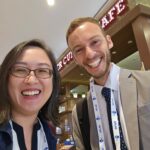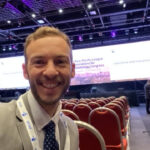SINGAPORE—In August, the Asia-Pacific League of Associations for Rheumatology (APLAR) Congress was held in Singapore, an island nation found at the southern tip of the Malay Peninsula. With a population of just under 6 million people and the highest per capita gross domestic product in Southeast Asia, Singapore is a small, successful nation and still quite young. It gained independence from the U.K. in 1965.1
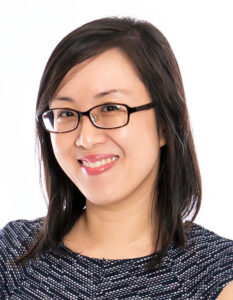
Dr. Ang
The Rheumatologist had occasion to speak with Elizabeth Ang, MBBS, MMed, MRCPCH, senior consultant, Division of Pediatric Allergy, Immunology & Rheumatology, Department of Pediatrics, Khoo Teck Puat-National University Children’s Medical Institute, National University Hospital. Dr. Ang was the first Singaporean physician to formally complete a fellowship in pediatric rheumatology in the U.S. and return to Singapore to practice. She—along with Thaschawee Arkachaisri, MD, FACR, another pioneer in pediatric rheumatology in Singapore—has been a driving force in helping grow the subspecialty in her home country.
Medical Education in Singapore
Dr. Ang explained that the Singaporean medical system is generally modeled after the U.K. system, with undergraduate medical education beginning after junior college—when students are typically 19 years old—and lasting five years. After graduation, students go on to complete a one-year housemanship (i.e., internship) to qualify for registration as a doctor with the Singapore Medical Council. (Note: Duke-NUS, the country’s second medical school and the first to be a post-graduate medical institution, opened in 2005.) Next, graduates apply for and enter their selected residency program.
Dr. Ang says she had significant exposure to general pediatrics as an undergraduate medical student, but not to pediatric rheumatology. “I had never met a pediatric rheumatologist during my training, but I was fascinated by the subject area,” she recalls.
In Singapore, many pediatric subspecialties are not formally credentialed, so it can be hard to find learning and mentoring opportunities in pediatric fields. However, a unique aspect of the Singaporean medical education system is that after residency, doctors in public institutions receive funding to spend 6–12 months abroad exploring opportunities that may be unavailable at home.
It was during this stage of her career that Dr. Ang received the Ministry of Health Academic Medicine Development Award and entered the Pediatric Rheumatology Fellowship Program at Boston Children’s Hospital. She spent 18 months in the program prior to taking her current position at the Khoo Teck Puat—National University Children’s Medical Institute at the National University Hospital of Singapore.
Listen to the ACR on Air episode featuring Dr. Elizabeth Ang. In this episode she and Dr. Jonathan Hausmann discuss Singapore’s healthcare system, access to biologics, cultural barriers to treatment and much, much more.
Access to Care
Dr. Ang sees a wide variety of patients in her clinical practice, made possible because of the unique aspects of the Singapore healthcare system. Singapore provides universal health coverage for its citizens through a mixed financing system. MedShield Life, the public statutory insurance system, covers large medical bills, such as those for inpatient care or certain outpatient treatments. Patients do still pay premiums, deductibles and co-insurance, and MedShield Life generally does not cover outpatient specialist care. However, MedShield Life is complemented by government subsidies in addition to a compulsory medical savings account, called MediSave, that employers and employees contribute to. Individuals can also purchase supplemental private health insurance or receive it through an employer.2
Dr. Ang says that, before she returned to Singapore, pediatric patients with rheumatic conditions were seen by a smattering of physicians—some who trained overseas and observed pediatric rheumatology or, in instances of renal involvement, a nephrologist. However, over the past 15–20 years, the number of pediatric rheumatologists in Singapore has grown to nine, and Dr. Ang and her colleagues are able to provide exceptional, up-to-date and evidence-based care.
Treatment trends: Biologic medications are widely available in Singapore, and the reduction in costs made possible by biosimilars has been dramatic. According to a study that examined the costs associated with five monoclonal antibodies—infliximab, adalimumab, trastuzumab, rituximab and bevacizumab—compared with biosimilars, there has been more than an 80% price reduction for medications with more than one approved biosimilar brand. The overall cumulative cost savings are estimated to be $136 million over the past five years.3
Dr. Ang is thankful for these trends because many of her patients have significant disease. “We see everything—juvenile idiopathic arthritis [JIA], systemic lupus erythematosus [SLE], dermatomyositis—and lupus nephritis in particular can be quite severe in our population,” she says.
Pediatric Rheumatology Care
Dr. Ang can compare and contrast some of what she has seen while providing medical care in the U.S. vs. Singapore. Example: The concept of pain amplification syndromes, such as fibromyalgia, is less prevalent in Singapore. In some cases, Dr. Ang has been able to diagnose these conditions and help children who were suffering without a clear path forward.
As is the case in many countries, patients and their families often have not heard of such conditions as JIA or SLE. Thus, Dr. Ang takes a holistic approach to the care of patients and is eager to partner with specialists in other areas to coordinate care.
Regarding differential diagnosis, Dr. Ang routinely keeps the possibility of infections in mind. But other than tuberculosis—which is endemic, Singapore generally has a lower incidence of tropical infections than surrounding countries in Southeast Asia. When infections are present, this factor may affect treatment decisions regarding how aggressive to be with immunosuppressive therapies.
International Efforts
-
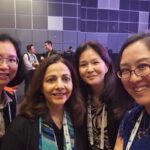
- From left: Swee-Ping Tang, MBBS, MRCP, FRCPCH, CSER; Sumaira Farman, MBBS, FRCP, FACP, FACR, SCE Rheumatology; Sern Chin Lim, MD, FRCPCH; and Dr. Ang
-
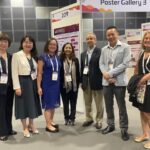
- From left: Deng Jianghong, MD, PhD; Caifeng Li, MD; Dr. Ang; Sumaira Farman, MBBS, FRCP, FACP, FACR, SCE Rheumatology; Sulaiman Al-Mayouf, MD; Mark Koh, MBBS; and Eve Smith, MBChB, BSc, MRCPCH, PhD
-
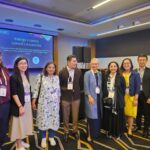
- From left: Lena Das, MD; unknown; Suma Balan, MBBS, MD; Thaschawee (Tash) Arkachaisri, MD, FACR; Raphaela Goldbach-Mansky, MD, MHS; Sumaira Farman, MBBS, FRCP, FACP, FACR, SCE Rheumatology; Dr. Ang; Teh Kai Liang, MBBS, MRCPCH, MMed; and Chester Huang, MD, MMed, MRCPCH
-
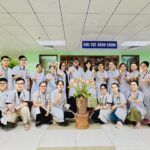
- Dr. Ang (back row, fifth from left) with two younger doctors from her team and members of the Department of Allergy, Immunology and Rheumatology at Vietnam National Children’s Hospital in Hanoi, where a three-day course in pediatric rheumatology was held in June
Dr. Ang has long held a strong interest in medical education and helps lead education efforts both at her home institution and abroad. She has substantial interaction with undergraduate medical students and general pediatric residents and exposes them to key concepts in pediatric rheumatology, fostering their interests in the field.
Additionally, Dr. Ang is involved in teaching in Cambodia, Vietnam and Indonesia. She was initially invited by a friend to teach at a non-governmental organization hospital in Siem Reap, Cambodia, which allowed her the opportunity to develop a curriculum. She continues to provide education in these nations and covers material in both a practical and aspirational manner.
“Many of these countries have fewer resources than Singapore, so I keep that in mind when I advise on what to do for patients,” Dr. Ang says. “However, I still teach evidence-based medicine, including regarding treatments that hopefully will one day be available in these locales.”
Dr. Ang is also actively involved in the APLAR as co-convener of the Pediatric Rheumatology Special Interest Group, and her goal is to continue to stoke interest in the specialty and grow the workforce across Southeast Asia.
As Singapore prepares to celebrate its 60th year of independence in 2025, the future looks bright for the rheumatologic care of children thanks to the work of Dr. Ang and her colleagues. Indeed, one can anticipate that the impact of Dr. Ang’s work will continue to improve the lives of many patients and enrich the education of trainees for years to come.
Jason Liebowitz, MD, is an assistant professor of medicine in the Division of Rheumatology at Columbia University Vagelos College of Physicians and Surgeons, New York. Dr. Liebowitz traveled to the APLAR Annual Congress in Singapore as part of the ACR/APLAR Exchange program. Click here for more about his experience.
References
- Map 2024—GDP per capita, current prices: Purchasing power parity; international dollars per capita. International Monetary Fund. 2024.
- Earn LC. International health care system profiles: Singapore. The Commonwealth Fund. 2020 Jun 5.
- Tan SH, Goh LGH, Ong BSK, et al. Impact of value-driven healthcare strategies for biosimilar adoption: The Singapore story. Pharmacoecon Open. 2024 Sep;8(5):679–688.
